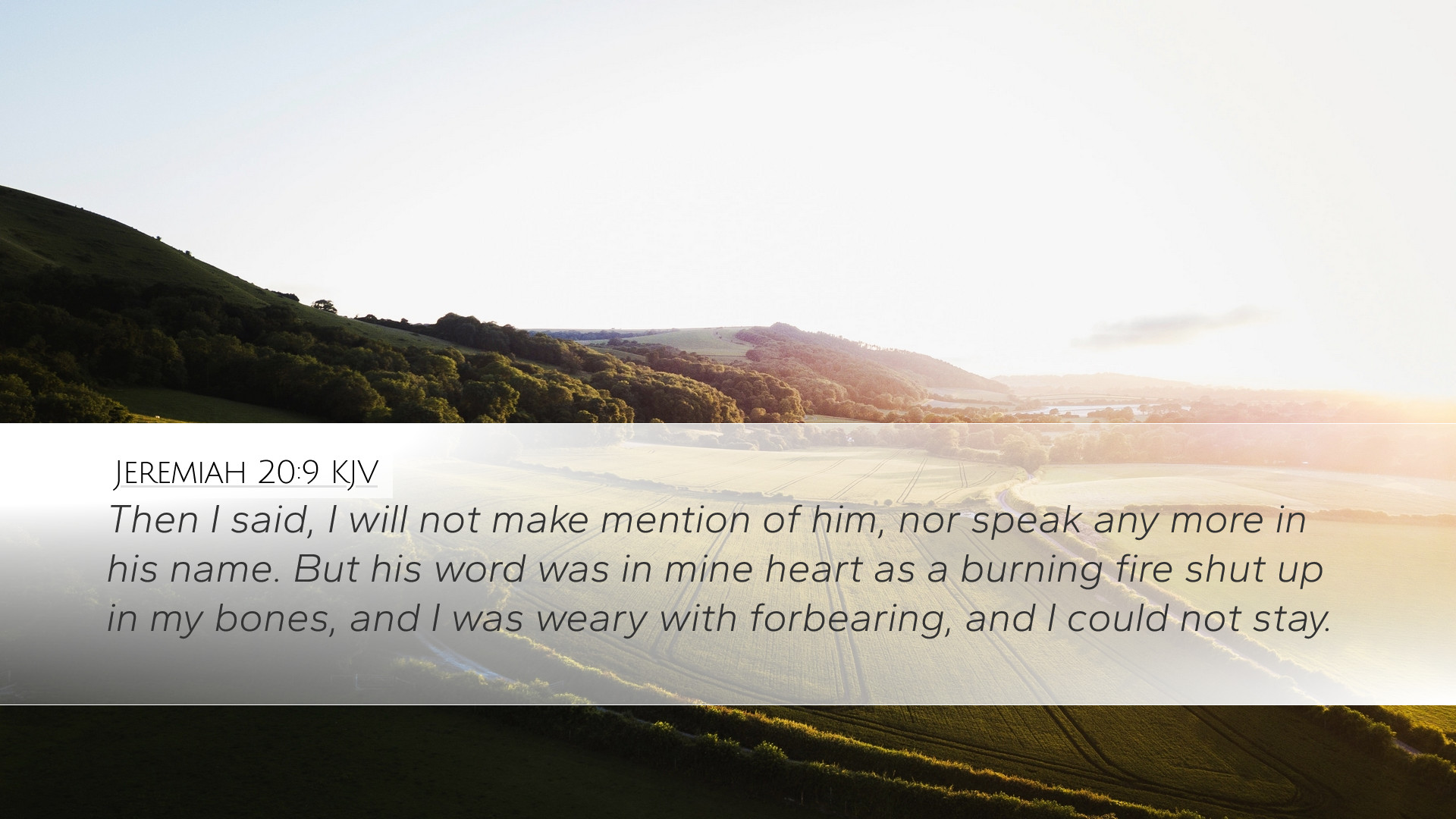Commentary on Jeremiah 20:9
Jeremiah 20:9 (KJV): "Then I said, I will not make mention of him, nor speak any more in his name. But his word was in mine heart as a burning fire shut up in my bones, and I was weary with forbearing, and I could not stay."
Introduction
The verse Jeremiah 20:9 captures the intense struggle of the prophet Jeremiah amidst his calling and the opposition he faced. It expresses his desire to remain silent amidst the persecution he encountered but reveals the overwhelming compulsion he felt to proclaim God’s word. This commentary synthesizes insights from public domain sources to provide a deeper understanding of this verse, emphasizing its theological implications and its relevance to believers today.
Contextual Background
Jeremiah, often referred to as the "weeping prophet," ministered during a tumultuous period in Israel's history. His prophetic mission was characterized by messages of warning, calling the nation to repentance due to impending judgment. In chapter 20, he grapples with the pain of rejection and the consequences of his prophetic ministry.
According to Matthew Henry, this chapter reflects Jeremiah’s heartfelt anguish over the ridicule and suffering he endured for speaking God’s truth—an experience not uncommon for many of God's faithful servants throughout history.
Analysis of the Verse
Jeremiah's declaration, "I will not make mention of him," signifies a moment of deep introspection and temptation to withdraw from his prophetic role. However, the contradictory resolution reveals an essential aspect of prophetic ministry—the divine compulsion that prohibits silence.
- Desire for Silence: Jeremiah expresses a natural human reaction to pain and persecution. Albert Barnes explains that Jeremiah's desire to cease speaking was driven by the relentless opposition he faced, illustrating the conflict between human frailty and divine calling.
- Divine Compulsion: The phrase "his word was in mine heart as a burning fire" elucidates the profound internal struggle. Adam Clarke interprets this burning sensation as a divine urgency that impels the prophet to speak despite the personal cost, echoing the notion that the call to prophesy cannot be quenched.
- Weariness: Jeremiah’s feeling of weariness from "forbearing" underscores the heavy burden that prophetic figures often carry. This weariness is not just physical but spiritual, highlighting the emotional toll of ministry and the constant tension between obedience to God and the fear of man.
Theological Implications
Jeremiah 20:9 invites deep theological reflection on the nature of God’s call and the responsibilities of His prophets. The struggle between the desire for silence and the compulsion to speak illustrates a universal theme in Scripture—the tension between personal suffering and divine mandate.
- God’s Sovereignty: The compelling nature of God’s word reflects His sovereignty over the lives of His servants. As Barnes points out, the burning word signifies that God's truth transcends human concerns and must ultimately prevail.
- The Role of Prophets: The verse encapsulates the prophetic role, which often involves speaking uncomfortable truths. It challenges leaders today to consider their responsibility to proclaim God’s message, despite societal pressures.
- Internal Conflict: Jeremiah’s internal conflict serves as a reminder of the human aspect of prophetic ministry. Clarke suggests that even the most committed servants of God experience moments of doubt and weariness, providing a model for believers who struggle with their call.
Application for Today’s Believers
Jeremiah 20:9 has significant implications for contemporary believers, particularly those in leadership and ministry roles. The encouragement to remain steadfast in God's calling, even in the face of adversity, is a timeless message.
- Responding to Discouragement: Believers may encounter varying degrees of rejection or indifference to the Gospel. This verse provides solace, reminding them that they are not alone in their struggles.
- Importance of God’s Word: The imagery of a burning fire emphasizes the potency and urgency of God's word. Pastors and teachers must recognize the necessity of faithfully delivering biblical truths, regardless of opposition.
- Encouragement for Endurance: The exhaustion Jeremiah felt serves as a reminder for spiritual leaders to seek rest and renewal in God. It encourages believers to build resilience in their faith walk through prayer and support from their communities.
Conclusion
In Jeremiah 20:9, the conflict between Jeremiah's desire for silence and the burning compulsion to proclaim God's word reflects the profound challenges faced by prophets and believers alike. By synthesizing insights from public domain commentaries, we gain a richer understanding of this verse's implications for faith, commitment, and the human experience in responding to God's call. Jeremiah’s experience resonates with Christians today, affirming that despite the trials of ministry and faith, the truth of God’s word must not remain suppressed.


